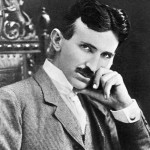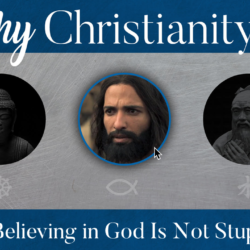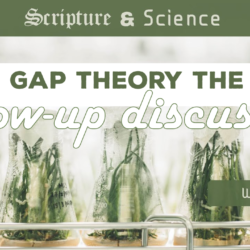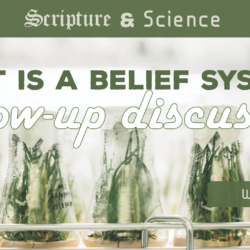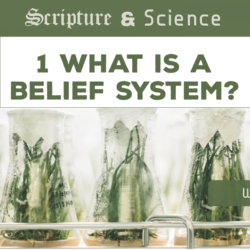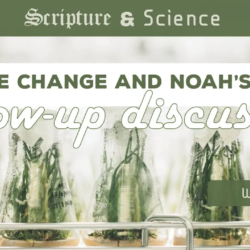This is part 5 of a series of posts called, “Identifying and Subverting Cultural Narratives.”
Scientism is the idea that the kind of knowledge gained from the scientific method is superior to all other means of acquiring knowledge if there are any other legitimate means. Scientism exalts empirical data and analysis over intuition, logic, emotion, and revelation.
Cultural Example 1: Science vs. Religion on Comedy Central
A comedian (Tom Papa), an atheist scientist (Neil Tyson), and a hipster pastor (Carl Lentz) discuss science and religion on Comedy Central’s The Nightly Show with Larry Wilmore. The host introduces the topic with the words “I’m very excited about this discussion. It’s one of my favorite issues. The war between science and religion is like one of the oldest wars between man ever, but we are going to solve it tonight.” Papa argues that science tends to discredit organized religion, but bolsters our faith in God. Tyson advances the claim that the knowledge we’ve learned from science disproves the existence of a benevolent God. Lentz claims that God invented science so there is no conflict between them.
Cultural Example 2: Richard Dawkins on Naturalism
Richard Dawkins draws out the implications of a purely materialistic understanding of the cosmos:
“On the contrary, if the universe were just electrons and selfish genes, meaningless tragedies like the crashing of this bus are exactly what we should expect, along with equally meaningless good fortune. Such a universe would be neither evil nor good in intention. It would manifest no intentions of any kind. In a universe of blind physical forces and genetic replication, some people are going to get hurt, other people are going to get lucky, and you won’t find any rhyme or reason in it, nor any justice. The universe we observe has precisely the properties we should expect if there is, at bottom, no design, no purpose, no evil and no good, nothing but blind, pitiless indifference. As that unhappy poet A. E. Housman put it: ‘For Nature, heartless, witless Nature/Will neither know nor care.’ DNA neither knows nor cares. DNA just is. And we dance to its music.”[1]
In both of these examples, scientific knowledge takes the front seat. Science makes a claim and we have no choice but to accommodate ourselves to it. Even if what science teaches us radically challenges our sensibilities about human rights or the inherent value of sentient life we have to accept it.
Benefits of Scientism
Even if Dawkins’ statement is excessively bleak, we can’t deny that science has furnished our world with many benefits. One is that science can help us avoid superstition. For example, we can do experiments to find out whether throwing salt over your left shoulder actually diminishes bad luck. Over enough trials, we can compare the results with a control group to find out if there is a statistical effect. Once disproved, we can save a good deal of salt. Another of science’s advantages is that it avoids making value judgments. For example, when a chemist nitrates glycerol, the process works the same every time, regardless if he uses the resultant nitroglycerin to help someone with chronic heart failure or to build a bomb to kill his enemies. Science works in a completely value-neutral way. Thus science functions in a universal way, independent of culture, language, or bias. It produces repeatable and reliable results. For example, we can do the same experiment in a cave in Africa that we do on a mountaintop in Pakistan and it will function according to the same scientific principles. We’ve capitalized on the reliability and universal applicability of science in engineering projects from bridges to skyscrapers as well as all manner of technology.
Detriments of Scientism
However, science, especially when divorced from other limiting philosophies, can have significant detriments. Because science is value-neutral, it can lead to human rights violations. For example, the holocaust in Germany and forced sterilizations in America resulted from applying Darwinism to society. In addition, scientific professionals like medical doctors tend to dehumanize people, seeing them as interacting systems (respiratory, muscular, neural, etc.) rather than individuals who deserve respect. Those who embrace scientific knowledge as the only valid epistemology, can’t help but look down on religious people and even curtail their rights (e.g. perhaps by forcing children to religion classes with a secular bent). Furthermore, scientism tends towards an arrogant ethnocentric view that disregards the contributions of other cultures that do not have the same level of scientific understanding.
Deconstructing Scientism
Although science obviously has a place, scientism has severe limitations. First of all, scientism is a self-contradictory notion. We cannot say that all knowledge must come from the scientific method because we did not get the scientific method from the scientific method. Furthermore in order to do physics, for example, you have to have faith that what you observe actually exists, that the universe is rational, and that we can generalize repeated observations into laws. Thirdly, since the rules of logic do not depend on empirical observation, scientism can’t be adequate. For example, how could we design an experiment to prove the law of non-contradiction?
Science also falls short in helping us in many other areas of life. What is the science of love? How can science teach me to have a better marriage or appreciate beauty? In fact, the more I think about it, the more I realize how limited science is. It can tell us about the laws that govern the physical world, but humans are free agents capable of acting in unpredictable, illogical, and contradictory ways. This is partly why human history and relationships are so fascinating as well as resistant to scientific analysis.
Beyond science’s limitations, there is the issue of reductionism. This is the practice of constantly reducing the macro to the micro in order to explain it. For example, the only reason you like chocolate is that your taste buds react with the chemicals and send a signal to your brain. Here is how C. S. Lewis critiqued reductionism:
Up to that point, the kind of explanation which explains things away may give us something, though at a heavy cost. But you cannot go on ‘explaining away’ for ever: you will find that you have explained explanation itself away. You cannot go on ‘seeing through’ things for ever. The whole point of seeing through something is to see something through it. It is good that the window should be transparent, because the street or garden beyond it is opaque. How if you saw through the garden too? It is not use trying to ‘see through’ first principles. If you see through everything, then everything is transparent. But a wholly transparent world is an invisible world. To ‘see through’ all things is the same as not to see.[2]
Even if science helps us to understand a myriad of phenomena, it does not do well making sense of the big picture. So, providing a scientific description of why chocolate tastes good doesn’t come close to actually explaining the chocolate experience. I may like chocolate because it takes me back to my childhood when my mom made me a special birthday cake. Chocolate may taste good because my wife bought it for me and it reflects her consideration and love for me. I may like chocolate because I want to fit in with other people who love chocolate. We cannot simply reduce it to chemistry, though that is part of the picture.
A Christian Perspective
Since the bible was around many centuries before modern science came about, it never addresses the subject directly. However, it emphatically teaches us that God created the universe. Within just the first two chapters of the first book, God calls his creation good seven times! Although the world fell into corruption when our first parents rebelled, it still retains much of its primordial grandeur and goodness. As a result, looking at the “natural” world has caused believers throughout history to praise God for his mighty works. Here are two examples from Psalms:
Psalm 8.3-4
3 When I look at your heavens, the work of your fingers, the moon and the stars, which you have set in place, 4 what is man that you are mindful of him, and the son of man that you care for him?Psalm 19.1-6
1 The heavens declare the glory of God, and the sky above proclaims his handiwork. 2 Day to day pours out speech, and night to night reveals knowledge. 3 There is no speech, nor are there words, whose voice is not heard. 4 Their voice goes out through all the earth, and their words to the end of the world. In them he has set a tent for the sun, 5 which comes out like a bridegroom leaving his chamber, and, like a strong man, runs its course with joy. 6 Its rising is from the end of the heavens, and its circuit to the end of them, and there is nothing hidden from its heat.
It just makes sense that studying the creation would lead to an increased admiration of the creator, just like examining a painting would garner more appreciation for a painter. But, for many centuries, the world’s most sophisticated thinkers believed in a steady state universe. This is the idea that the world had always been here without beginning or cause. Even Albert Einstein himself couldn’t accept the implications of his own equations governing the theory of General Relativity. He inserted a “fudge factor” to keep them from supporting an expanding universe. When Edwin Hubble proved definitively that the universe was expanding, the scientific community balked at the implications. In fact, it was an atheist scientist that coined the term “big bang” to make fun of the idea. He thought the notion smacked of creation ex nihilo, a distinctly biblical view. And yet, the whole time Genesis was there, in thousands of copies, clearly stating, “In the beginning God created the heavens and the earth” (Gen 1.1) Bang!
Sadly, our culture is always telling us that God and science have been at war with one another forever. In fact, this idea is rather recent. For example, consider these myths from Jeffrey Koperski’s The Physics of Theism: God, Physics, and the Philosophy of Science.
- science and religion have been at war with one another since the Catholic Inquisition tortured Galileo
- Christians taught the world was flat until Christopher Columbus proved otherwise
- The scientific revolution freed Europe from the grip of religion
None of these are true! Science and religion have not historically been at war with each other. In fact the opposite is the case. Religion, Christianity in particular, gave birth to modern science. The great pioneers of science believed in God. In fact, it was precisely their belief in God that led them to seek the laws by which he governed the world. But, don’t take my word for it. Here are quotes from some of the most influential scientists of the last five hundred years:
 Nicolaus Copernicus (1473-1543) put forward the heliocentric model of the universe, triggering the Copernican Revolution
Nicolaus Copernicus (1473-1543) put forward the heliocentric model of the universe, triggering the Copernican Revolution
“To know the mighty works of God, to comprehend His wisdom and majesty and power; to appreciate, in degree, the wonderful workings of His laws, surely all this must be a pleasing and acceptable mode of worship to the Most High, to whom ignorance cannot be more grateful than knowledge.”

Johannes Kepler (1571-1630) discovered laws of planetary motion
“Those laws are within the grasp of the human mind. God wanted us to recognize them by creating us after his own image so that we could share in his own thoughts.”
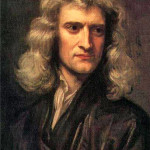 Sir Isaac Newton (1642-1727) derived the equations governing gravity, built the first reflecting telescope, and made major contributions to calculus and optics
Sir Isaac Newton (1642-1727) derived the equations governing gravity, built the first reflecting telescope, and made major contributions to calculus and optics
“In the absence of any other proof, the thumb alone would convince me of God’s existence.”
“I have a fundamental belief in the Bible as the Word of God, written by those who were inspired. I study the Bible daily.”
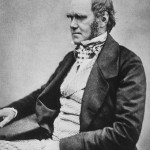 Charles Darwin (1809-1882) originated the theory of evolution via natural selection
Charles Darwin (1809-1882) originated the theory of evolution via natural selection
“Another source of conviction in the existence of God, connected with the reason and not with the feelings, impresses me as having much more weight. This follows from the extreme difficulty or rather impossibility of conceiving this immense and wonderful universe, including man with his capacity of looking far backwards and far into futurity, as the result of blind chance or necessity. When thus reflecting I feel compelled to look to a First Cause having an intelligent mind in some degree analogous to that of man; and I deserve to be called a Theist.”
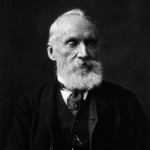 Lord William Kelvin (1824-1907) formulated the first and second laws of thermodynamics and engineered the electric telegraph, including the transatlantic project
Lord William Kelvin (1824-1907) formulated the first and second laws of thermodynamics and engineered the electric telegraph, including the transatlantic project
“If you study science deep enough and long enough, it will force you to believe in God.”
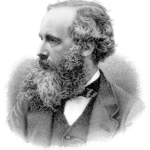 James Clerk Maxwell (1831-1879) formulated the classical theory of electromagnetism in his Maxwell’s equations
James Clerk Maxwell (1831-1879) formulated the classical theory of electromagnetism in his Maxwell’s equations
“I have looked into most philosophical systems and I have seen that none will work without God.”
“Science is incompetent to reason upon the creation of matter itself out of nothing. We have reached the utmost limit of our thinking faculties when we have admitted that because matter cannot be eternal and self-existent it must have been created.”
Nikola Tesla (1856-1943) was an inventor who is best known for his work on electricity, including designing the supply system for alternating current, developing x-ray imaging, and building a wirelessly controlled boat
“The gift of mental power comes from God, Divine Being, and if we concentrate our minds on that truth, we become in tune with this great power.”
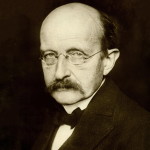 Max Planck (1858-1947) won a Nobel Prize in physics for his seminal work on quantum theory
Max Planck (1858-1947) won a Nobel Prize in physics for his seminal work on quantum theory
“There can never be any real opposition between religion and science; for the one is the complement of the other. Every serious and reflective person realizes, I think, that the religious element in his nature must be recognized and cultivated if all the powers of the human soul are to act together in perfect balance and harmony. And indeed it was not by accident that the greatest thinkers of all ages were deeply religious souls.”
What I love about these quotations is that they obliterate so much mythology about how Christians oppose science. So often we hear people driving a wedge between faith and reason as if faith is believing in something despite evidence to the contrary whereas reason only believes in what can be proved. True faith does not oppose evidence but embraces it in order to trust someone or something. Consider this example from John Lennox:
If I go into my bank manager with a project of making money, the issue for the bank manager is can he place his faith in me? Can he trust me? …Now he will want reasons to trust me. He will want evidence on which to base his faith in me. And he will ask me a whole series of very penetrating questions in order to see whether his faith is justified. And that applies right across the board. When we say we have faith in something, we trust it; we believe in it. The next logical question is, “What reasons have you got? What evidence have you got for believing it?” So if I say, “God is the creator of the universe.” You are perfectly justified in saying, “What reasons have you got?” So we need to distinguish faith from blind faith. …A man’s faith in his wife is not blind… It is evidence-based faith, but it is nonetheless faith. So to say that all faith is blind faith is simply wrong using faith in its general context, but it’s also wrong using faith in its specifically religious context.”[3]
Furthermore, Jesus does not expect people to just believe in him blindly. He repeatedly points to his works as evidence for his words. He says:
John 10.37-38
37 If I am not doing the works of my Father, then do not believe me; 38 but if I do them, even though you do not believe me, believe the works, that you may know and understand that the Father is in me and I am in the Father.”John 14.10-11
10 Do you not believe that I am in the Father and the Father is in me? The words that I say to you I do not speak on my own authority, but the Father who dwells in me does his works. 11 Believe me that I am in the Father and the Father is in me, or else believe on account of the works themselves.
Whether speaking to his disciples or to outsiders, Jesus is consistent. He does not demand faith, but requests it on the basis of evidence. In fact, he says we shouldn’t believe in him if he doesn’t do the works of his father. Later on when John explains his own evangelistic purpose in writing his Gospel, he says:
John 20.30-31
30 Now Jesus did many other signs in the presence of the disciples, which are not written in this book; 31 but these are written so that you may believe that Jesus is the Christ, the Son of God, and that by believing you may have life in his name.
In other words, he’s presents this specific evidence so that we would have good reason to believe that Jesus truly is the Christ. He doesn’t just say, “Take it on faith.” He says that this is what happened. Jesus did these things. He believes Jesus is the Christ because of this and so should you.
As Christians, we believe God can reveal his truth to people both directly (through revelation) and indirectly (through creation). So, in the end, the Christian perspective embraces science while rejecting scientism. It is not helpful or necessary to reduce how we gain knowledge to only what the scientific method says. Life is far too complicated for that. Besides, science needs a value system to guide it. Christianity provides the moral compass to help science become a force for good in our world.
Check out part six of this series: Consumerism.
[1] Richard Dawkins, River Out of Eden (New York: Basic Books, 1995), pp. 132-3.
[2] C. S. Lewis, The Abolition of Man (New York: HarperOne, 2001), pp. 80-1.

